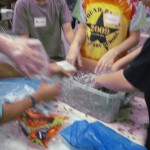My life is always interesting, never boring! Last week I spent a day at a nearby middle school teaching kids about where their garbage goes and how to reduce their waste stream. By the end of the session,they saw the wisdom of worm composting.
When talking about waste, I jokingly refer to the magical place called “away”. That’s where we send all the stuff we no longer need. There really is no “away”, our unwanted junk goes somewhere and often it is not pretty. When I asked 6-8th graders where their garbage goes when it is picked up at the curb, I got some interesting answers. Many thought it went to either the “dump” or out to the ocean. None of them had any idea that it all goes to an incinerator in nearby Peekskill, NY. From there, it goes into the air and into our lungs. The remaining ash is highly toxic and is shipped to a “mono-fill landfill”- a special type of landfill for toxic ash in a neighboring state. Its no surprise that Westchester county has poor air quality considering that the incinerator burns an average of 200 tons of garbage a day 24/7/ 365. That’s right, the fire never goes out!
From there, the students brainstormed other ideas for getting rid of our endless supply of garbage. Shooting it into space was one suggestion. After troubleshooting for a while, they came face to face with the fact that we have a big mess to contend with.
So what does any of this have to do with worm composting?
That’s a great question! Let me explain.
Worm composting is one way to take unwanted waste and transform it into something highly useful. This is a great example of upcycling. As in nature, nothing is wasted in worm composting.
We built some worm bins using plastic containers, shredded paper, food scraps and worms. Some of the lucky students brought them home. By taking care of these red wriggler worms, they will learn a valuable lesson and will never look at a banana peel the same way again.
The average household creates 200-300 pounds of food waste yearly. If we can take this out of the waste stream, we’ll have both cleaner air and water.

Nitrous oxide, aka "Laughing Gas" is a harmful greenhouse gas that is 400X worse than CO2. It is released by synthetic fertilizers
As an added bonus, worm compost makes a great fertilizer.
Most people don’t realize that Miracle Grow and other synthetic nitrogen fertilizers are made using natural gas. These fertilizers release nitrous oxide into the atmosphere. You probably have heard of nitrous oxide- its laughing gas. What it does to the environment is no laughing matter. Nitrous oxide is 400 times more harmful than CO2 as a greenhouse gas.
Worm castings ( aka worm poop!) act as a natural organic fertilizer and soil conditioner. All angles of worm composting make sense, its a circular system. Unlike our county’s incinerator which is linear and ends up with a bigger mess than what we started with.
Want a worm composting workshop for your class or group?
Contact me, I’d be happy to help!


